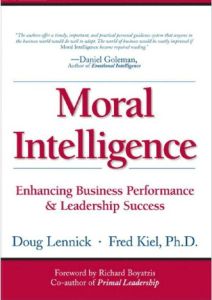Join getAbstract to access the summary!

Join getAbstract to access the summary!
Doug Lennick and Fred Kiel
Moral Intelligence
Enhancing Business Performance and Leadership Success
Wharton School Publishing, 2005
What's inside?
You can do well in business by being good, if you have the moral competence to act on your moral intelligence.
Recommendation
This book maintains that morality is a sure route to management success and, implicitly, to riches. Authors Doug Lennick and Fred Kiel use stories and examples to support their explanation of the role of moral intelligence in business. They provide an abundance of anecdotes in a style that will be familiar to readers of the "Chicken Soup" series, while conveying a serious management message, if sometimes vaguely. A leader needs a moral compass to steer an organization; it is as necessary as a budget and a business plan. To evaluate your standing, see the appendix for useful questionnaires and forms. getAbstract recommends this book to those who are interested in applying their moral values to their work. If you are a person of integrity, honor and good character, you will find that this book is a practical affirmation that these sterling traits are essential in business. And if you are not such a person, well, you may need it even more.
Summary
About the Authors
Doug Lennick is an executive vice president of a leading international financial services and credit card company, and headed its retail distribution business. Fred Kiel, Ph.D., is a prominent executive coach.

















Comment on this summary